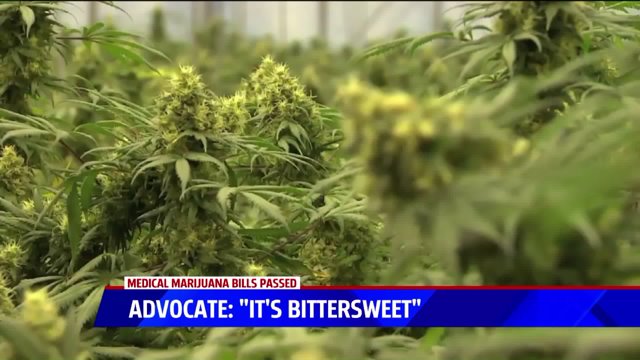LANSING -- After 11 months of sitting on and then reworking a three-bill package, the Michigan Senate passed medical marijuana law reform to legalize oils, edibles, and dispensaries but with a tiered regulation structure.
As it stands, Michigan's medical marijuana law is cloudy at best. Thursday the Michigan Senate approved HB 4209, 4210, and 4827 alongside introducing SB 141 and 1014. Patient advocates and leaders like Jim Powers calls it "bittersweet."
Powers' seven-year-old son Ryan depends on medical marijuana oils high in CBD to treat severe health issues. He's fought tooth and nail for the passage of HB 4210 which would legalize marijuana-infused products like edibles and oils.
However, when it comes to the licensing and regulation for growers to dispensaries, Powers believes the proposed legislation will drive up the cost of their medicine especially due to the "secured transporter" clause in HB 4209.
"The growers will have to sell their marijuana to a retail center and the owner cannot be the same in both facilities, in addition they’re not allowed to transport their marijuana directly to the retail center, or to a testing facility, or to a manufacturer that might make medibles or extracts," said Powers. "[Growers would be] forced to use a secured transporter who’s going to charge an additional fee on top of what’s already being charged simply to transport the marijuana from point A to point B. We feel that that will absolutely increase the final cost to patients.”
Yet Sen. Rick Jones, R - Grand Ledge, who's supported the three-bill package with modifications, and opposes recreational marijuana legalization, disagrees. In speaking with FOX 17 Friday he said, "The estimates are this would have very little effect on the price."
Jones said there are no limits proposed to the amount of secured transporter licenses, and explained the regulations with function like a five-tiered system.
“We voted that there would be licensed growers, licensed transporters, licensed dispensaries, they can all be inspected by the state, make sure they’re all doing what they’re supposed to do," said Jones. "Also there will be labs testing the product to make sure that the product is safe. There will be taxes collected, and the cities, the townships, the counties will get part of this money to help with what they need to do in policing.”
The bills give power to local government to enact ordinances to determine if and how dispensaries would function in their municipalities. Overall, a three-percent excise tax would be collected; part of which would be distributed back to the local municipalities.
The bills go back to the Michigan House for a vote, and a first look at the introduced Senate bills.



